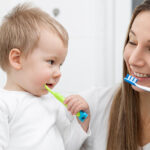That morning hug felt a little…off. A tiny wrinkle appeared on your nose as your child leaned in, their breath carrying an unexpected and slightly alarming odor. Bad breath in kids, often dubbed “dragon breath,” is a common concern for parents, and while sometimes it’s a fleeting issue, persistent halitosis can be a sign of underlying problems that deserve attention. At Madison Dentistry & Implant Center, we understand the worry this can cause. That’s why we’ve compiled this comprehensive guide to help you understand the causes of bad breath in kids, learn effective remedies, and know when it’s time to seek professional dental advice.
This isn’t just about masking an unpleasant smell; it’s about ensuring your child’s oral and overall health. So, let’s dive deep into the world of kids’ bad breath and equip you with the knowledge and tools to tackle it head-on.
The Usual Suspects: Common Causes of Bad Breath in Children
Before you start panicking, it’s important to understand that many cases of bad breath in children are linked to everyday habits and easily treatable conditions. Here are some of the most common culprits:
- The Power of Poor Oral Hygiene: Just like adults, children need consistent and thorough oral hygiene practices. When brushing and flossing are inadequate, food particles and bacteria accumulate in the mouth. These bacteria break down food debris, releasing sulfur compounds that are the primary cause of bad breath. This is why a quick swipe of the toothbrush often isn’t enough.
- The Tongue: A Bacterial Playground: The tongue’s textured surface provides an ideal environment for bacteria to thrive. Often overlooked during brushing, the back of the tongue can harbor a significant amount of odor-causing microorganisms.
- Food Glorious Food (and Its Lingering Effects): Certain foods are notorious for causing temporary bad breath. Garlic, onions, cheese, and sugary snacks can leave lingering odors in the mouth as they are digested. While these smells usually dissipate relatively quickly, they can be noticeable in the interim.
- Dry Mouth: When Saliva Flow Slows Down: Saliva plays a crucial role in washing away food particles and neutralizing acids in the mouth. When saliva production decreases, the mouth becomes a breeding ground for bacteria. Dry mouth can be caused by dehydration, mouth breathing (often due to nasal congestion), or certain medications.
- Nighttime Breath: The Morning After: Have you ever noticed your child’s breath is a little stale in the morning? This is perfectly normal. During sleep, saliva production naturally decreases, allowing bacteria to multiply. This “morning breath” usually disappears after brushing and eating breakfast.
Beyond the Basics: Exploring Less Obvious Causes
- While poor oral hygiene and diet are frequent offenders, other factors can contribute to persistent bad breath in children:
- Nasal Congestion and Sinus Infections: When a child has a cold, allergies, or a sinus infection, they often breathe through their mouth. This leads to dry mouth, as mentioned earlier, creating an environment conducive to bacterial growth. Additionally, mucus from sinus infections can drain into the back of the throat, contributing to bad breath.
- Tonsil Stones: Hidden Odor Traps: Tonsils have small crevices called crypts. Sometimes, food particles, mucus, and dead cells can get trapped in these crypts and calcify, forming small, white or yellowish deposits called tonsil stones (tonsilloliths). These stones harbor bacteria and can have a strong, unpleasant odor. You might occasionally see them in the back of your child’s throat.
- Foreign Objects in the Nose: Young children, especially toddlers, are curious and sometimes insert small objects into their noses. If an object gets lodged and isn’t removed, it can cause a foul-smelling discharge and, consequently, bad breath. This is a less common cause but one to be mindful of if the bad breath is accompanied by other nasal symptoms.
- Certain Medications: Some medications can cause dry mouth as a side effect, indirectly leading to bad breath. If your child has recently started a new medication and you’ve noticed a change in their breath, it’s worth discussing this with their pediatrician.
- Underlying Medical Conditions: In rare cases, persistent bad breath could be a sign of an underlying medical condition, such as gastroesophageal reflux disease (GERD), where stomach acid backs up into the esophagus, or certain metabolic disorders. If you’ve ruled out the more common causes and the bad breath persists despite your best efforts, it’s crucial to consult with both your pediatrician and Madison Dentistry & Implant Center.
Actionable Strategies: Banishing Bad Breath and Promoting Freshness
Now for the good news: in most cases, bad breath in children can be effectively managed with consistent effort and the right strategies. Here are some actionable tips you can implement at home:
- Supercharge Their Brushing Routine: Ensure your child brushes their teeth thoroughly for at least two minutes, twice a day. Use a soft-bristled toothbrush and fluoride toothpaste appropriate for their age. Make it a fun and engaging activity to encourage compliance.
- Don’t Forget the Floss! Flossing removes food particles and plaque from between teeth, areas that the toothbrush can’t reach. Aim to floss at least once a day, preferably before bedtime. For younger children, flossing aids can make the process easier.
- Tackle the Tongue: Gently brush your child’s tongue, especially the back, to remove odor-causing bacteria. You can also use a tongue scraper specifically designed for this purpose.
- Hydration is Key: Encourage your child to drink plenty of water throughout the day. This helps to keep their mouth moist and washes away food particles and bacteria.
- Limit Sugary Snacks and Drinks: Sugary foods and drinks contribute to bacterial growth in the mouth. Offer healthy alternatives like fruits, vegetables, and water.
- Rinse and Repeat (with Water): After meals and snacks, have your child rinse their mouth with water to help dislodge any remaining food particles.
- Regular Dental Checkups at Madison Dentistry & Implant Center: Consistent visits to our dental professionals are crucial for maintaining your child’s oral health. We can identify and address any underlying issues contributing to bad breath, provide professional cleanings to remove plaque and tartar buildup, and offer personalized advice on oral hygiene practices.
- Address Nasal Issues: If your child suffers from allergies or frequent nasal congestion, work with their pediatrician to manage these conditions. This can help reduce mouth breathing and subsequent dry mouth.
- Observe and Report: Pay attention to when your child’s bad breath is most noticeable and any other accompanying symptoms. This information can be helpful for your dentist or pediatrician in diagnosing the cause.
When to Seek Professional Help: Recognizing Red Flags
While most cases of bad breath in children are benign, certain signs warrant a visit to Madison Dentistry & Implant Center or your pediatrician:
- Persistent bad breath: If the bad breath doesn’t improve despite consistent oral hygiene practices.
- Mouth pain or discomfort: This could indicate a dental issue or infection.
- Swollen gums or bleeding: These are signs of gum disease.
- Visible tonsil stones: While often harmless, persistent or large tonsil stones might require intervention.
- Nasal discharge with a foul odor: This could indicate a foreign object or infection.
- Other systemic symptoms: If your child has fever, fatigue, or other unusual symptoms along with bad breath, consult their pediatrician.
At Madison Dentistry & Implant Center, we take a comprehensive approach to your child’s oral health. If you’re concerned about your child’s bad breath, don’t hesitate to schedule an appointment. We can conduct a thorough examination, identify the underlying cause, and recommend the most appropriate treatment plan.
Conclusion: Bad Breath in Kids
Establishing good oral hygiene habits early in life is crucial for preventing bad breath and promoting overall health. By educating your child about the importance of brushing, flossing, and a healthy diet, you’re setting them up for a lifetime of fresh breath and healthy smiles. Remember to be patient, consistent, and make it a positive experience.
Bad breath in kids is a common challenge, but with understanding, diligence, and the support of professionals like those at Madison Dentistry & Implant Center, you can help your child bid farewell to “dragon breath” and embrace a confident, fresh smile. Schedule your child’s next dental checkup with us today – we’re here to help!




